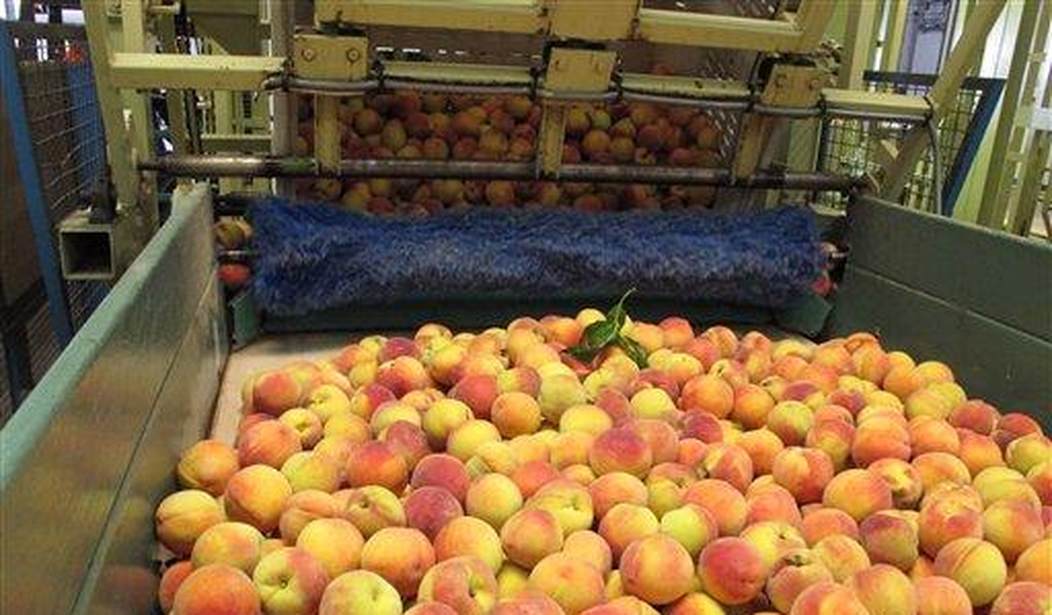Who doesn't love a good peach? Raw peaches, peach pie (with French vanilla ice cream!), or peach cobbler — it's all good stuff.
Georgia (the American state, not the European nation) is, of course, famous for peaches. In fact, it's called "The Peach State" because of that. I've eaten a Georgia peach a time or two in my life, and yes, they are mighty good, no matter how you consume them.
This brings up the question: Should we be concerned about peach yields? A recent article by a Georgia news outlet, Atlanta News First (AFN), claims that climate change is threatening Georgia's peach farmers. There's just one problem with their article; one thing that knocks their climate alarmism into a cocked hat.
The article written by Abby Kousouris, titled “Georgia farmers, restaurant owners say climate change threatens way of life,” pushes the narrative that climate change is uniformly warming the planet and adversely affecting agriculture. This claim, though often asserted by climate alarmists, is specifically debunked by regional climate and crop data.
Contrary to the widespread assertion that global warming is causing uniform temperature increases, data from the National Oceanic and Atmospheric Administration (NOAA) indicate that the Southeastern United States has experienced a cooling trend over recent decades. This phenomenon, often linked to the polar vortex, has led to colder winters in the region, defying the generalized warming narrative. As reported by Forbes, “Defying Climate Change, Southeast U.S. Is Getting Colder Instead of Warmer via Polar Vortex.” This cooling trend challenges the premise that warming temperatures are responsible for agricultural difficulties in Georgia.
Well, there's one fact: The southeastern United States — Georgia, in case any Ivy League-educated liberals are reading this, is in the southeastern United States — is actually cooling slightly. Now, that could affect crop yields for the worse by reducing not only the temperatures but the length of the growing season.
But as it turns out, the peach crop is doing just fine. A recent drop was not due to global warming, but local — and temporary — cooling.
Shot:
The article suggests that climate change is threatening Georgia’s peach industry. Yet, in 2024, Georgia experienced one of its most successful peach harvests to date. According to the Georgia Peach Council, growers anticipated shipping approximately 3 million boxes, or 75 million pounds, of peaches, marking a 25% increase over a typical crop. This substantial yield contradicts the claim that climate change is detrimentally impacting peach production in the state.
A sharp decline in Georgia peach production in 2023 came in the aftermath of a late-season freeze, the very type of weather event that is projected to become more infrequent as the planet modestly warms.
Chaser:
Strangely, just 6 months previous to the present article, ANF ran a video article titled Georgia farmers say 2024 peach crop is best ever. Apparently ANF doesn’t pay attention to its own news reports when it comes to producing scary climate change stories.
So, yes, it would be good for ANF to read their own articles. This is a pretty enthusiastic piece about the bumper peach crop Georgia growers enjoyed in 2024. Here, see for yourself:
That's the problem with so many when dealing with matters of science — they don't know how to do science. Oh, these same reporters will claim, "The science says..." when talking about issues like the climate. But science doesn't say anything. Science — the scientific method — is a tool. It's a tool used to gather data, form hypotheses, and test those hypotheses — and if the hypothesis proves wrong, you don't ignore the data; you change your hypothesis.See Related: Who Knew? Atmospheric CO2, It Turns Out, Is Good for Plants.
NASA Carbon Emissions Computer Model Scare-Mongers, but Raises More Questions Than It Answers
It's interesting how often we find the claims of climate scolds to be spurious — and how often we find them so for the same reason.
We look at the data.
My background is in the sciences, with a strong leavening in logic. I spent thirty years teaching big corporations, many of whom you would recognize were I to name them, how to carry out cause analyses, and failure analyses, and to extract information from data. But the first thing I always taught those companies was to look at your data and, more importantly, how they gathered and verified their data. If your data is bad, there can be no good results from any subsequent analysis.
That's the problem, too often, with the claims of climate scolds. Their data is bad. This ANF piece just presents another example of precisely that.













